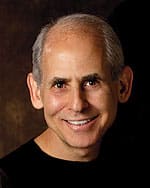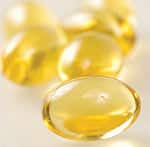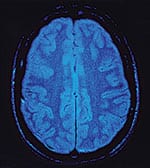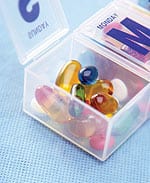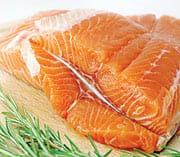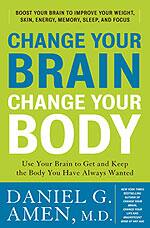Life Extension Magazine®
We have long known that certain foods affect the chemical balance of our brain, and thus our mood. Dr. Daniel Amen, an assistant clinical professor of psychiatry and human behavior at the University of California, Irvine School of Medicine, takes this a step further. Amen maintains that incorporating specific natural nutritional supplements into our diets can help support cognitive health. Amen certainly has the credentials and experience to make such a claim: a physician, child and adult psychiatrist, brain imaging specialist, and bestselling author, Amen is also the medical director of Amen Clinics, Inc. (ACI), with facilities in four cities across the country. ACI, boasting the world’s largest database of functional brain scans related to psychiatric medicine, is a leader in applying brain imaging science to clinical practice. At Irvine, Amen teaches medical students and psychiatric residents about using brain imaging in clinical practice. Images, he explains, are obtained through a technique called single photon emission computed tomography (SPECT), a nuclear medicine imaging technique using gamma rays. Similar to conventional nuclear medicine planar imaging, SPECT is able to provide true three-dimensional information, which Amen says has helped him reliably identify seven different types of anxiety and depression, six types of Attention Deficit Disorder (ADD), and five types of obesity. Amen teaches medical students and psychiatric residents about using brain imaging in clinical practice. Imaging Clarity for Better TreatmentAmen maintains more than 60,000 brain scan images at his clinics. He says they have given him a clearer picture of what happens inside the brain when things aren’t quite as they should be. “SPECT examines blood flow and activity patterns,” says Amen. “Unlike other scans, it focuses on brain function, as opposed to anatomy or structure.” Two images are typically taken, one at rest and one during a concentration exercise. “Scans reveal in distinct colors areas of the brain that work well, areas of the brain that do not work hard enough, which can lead to cognitive disorders, and areas of the brain that work too hard.”
Through his research, Amen has learned that most psychiatric illnesses are not single or simple disorders. “I believe we hurt people by putting them automatically into certain categories and trying to treat accordingly,” he elaborates. “Take, for example, depression. Most doctors who prescribe natural supplements would recommend St. John’s Wort. But it’s not that simple. You need to know exactly what type of depression you’re dealing with.” Amen says that if everyone was simply given St. John’s Wort, it would certainly show improvements in depressive symptoms for some patients—but others would only get worse. You have to tailor any supplements to an individual person’s brain, and not just assume that one treatment fits all.” Amen says that this has been a major component of his work. In his imaging experience, the catch-all category of obesity has been revealed to be five different categories, each with respective treatments including natural supplements that need to be tailored to the specific type of problem. In addition to exercise, a compulsive overeater could be prescribed serotonin boosters like 5-HTP (5-hydroxytryptophan) to control appetite, and inositol extract to regulate mood. Inositol is required for the proper function of several brain neurotransmitters including serotonin and acetylcholine; reduction of inositol levels in the cerebrospinal fluid have been shown to be low in patients with depression. For an impulsive overeater, however, treatment would comprise totally different supplements: dopamine boosters like green tea and L-tyrosine, an amino acid utilized by the body to synthesize protein and increase plasma neurotransmitter levels (particularly dopamine and norepinephrine). In addition, increased protein intake and exercise would be indicated. Overeaters and anxious overeaters, similarly, would have a supplement regimen tailored to their specific type of disorder. Supplemental TreatmentAs with obesity, once a specific disorder diagnosis is determined, Amen will employ nutritional supplements as the first line of defense in order to help put things right again. “We are heavily focused on natural ways to heal the brain,” he says. Following brain scans, Amen adopts specific approaches for several major categories of disorders: ADD/ADHD: “Once again,” he emphasizes, “you have to know the exact type of ADD the person has. Should they have a kind of ADD that is associated with low brain activity, then they would receive a stimulant like Ritalin®.” From a supplement standpoint, Amen might prescribe green tea, L-tyrosine, or rhodiola, which has been shown in studies to alleviate stress and symptoms of mild depression. “These supplements have been shown to boost blood flow,” he adds. On the other hand, if a patient has over-focused ADD, where certain parts of their brain are low in activity while other parts are high, Amen might use a combination of green tea and a serotonin booster such as 5-HTP. All disorders, incidentally, are treated with omega-3 fatty acid supplements in addition to the recommended disorder-specific supplement. Clinical evidence shows that omega-3s (e.g., fish oil or flaxseed oil supplements) play a crucial role in brain function as well as normal growth and development. Studies also suggest possible benefit for people suffering from depression, bipolar disorder, schizophrenia, and ADHD (attention deficit/hyperactivity disorder).
Anxiety and depression: This also depends on the type. In addition to omega-3 supplements, Amen would recommend optimizing vitamin D levels. “Low levels of vitamin D have been associated with physical maladies like rickets, bone disorders or heart disease, but it’s also an important factor in brain imbalances like depression and memory issues,” he explains. “If I hope to get my patients stable, vitamin D is something I need to make sure is tested and regulated through supplementation as and when necessary.” Amen believes typical recommended levels of vitamin D are too low. “The normal range in lab tests is less than what I’ve found to be ideal in terms of benefits,” he says. “I like to keep vitamin D levels in my patients between 50 and 100 nanograms per milliliter.” OCD: In any compulsive anxiety disorder, serotonin boosters (i.e., 5-HTP or St. John’s Wort) are the primary indicated supplements, in addition to omega-3 fatty acids, adds Amen. Research has suggested that OCD results from a brain imbalance of the neurotransmitter serotonin. These studies have shown that OCD patients tend to have lower levels of serotonin, supported by evidence that drugs which increase serotonin output reduce symptoms of OCD. Alzheimer’s Disease and memory loss: Amen believes boosting acetylcholine (ACh) can help with brain repair. During the course of the normal aging process, concentrations of ACh tend to decrease, resulting in sporadic lapses of short-term memory. Normal, non-debilitating decline in memory, referred to as age-associated memory impairment, is distinct from Alzheimer’s disease, a serious brain disorder in which levels of ACh can drop by as much as 90%. Supplements such as choline or DMAE (or dimethylaminoethanol, a natural precursor for choline that crosses readily into the brain, thereby helping to make acetylcholine) have been shown to produce improvements in brain-wave patterns in parts of the brain that play a pivotal role in memory and attention span. DMAE has, incidentally, also been adopted as a possible alternative to Ritalin® in the treatment of ADD-afflicted children, demonstrated in studies to provide similar benefits without the typical side effects.
Substance abuse: As with overeaters, Amen first provides the by-now-familiar qualifier: “Supplementation largely depends on the type of substance abuse problem. In cases of compulsive addiction, serotonin and 5-HTP may help.” For impulsive addicts, Amen maintains that dopamine and L-tyrosine are more beneficial. Anxiety-related addictions benefit from GABA (gamma-aminobutyric acid, the chief inhibitory neurotransmitter in the mammalian central nervous system). GABA plays a role in regulating neuronal excitability throughout the nervous system. Supplements that increase the available amount of GABA typically have relaxing, anti-anxiety and anti-convulsive effects. Depressive addicts, says Amen, will usually show improvement after taking SAMe (S-adenosylmethionine). SAMe supplements are the synthetic form of a molecule produced naturally in the body from the amino acid methionine and adenosine triphosphate, an energy-producing compound found in all cells in the body. SAMe may enhance the effect of mood-boosting brain chemicals like serotonin and dopamine by regulating their breakdown or by speeding production of the receptor molecules they attach to. SAMe may also make existing receptors more responsive. Daily FixOf course, not everyone suffers from the above-mentioned disorders. Amen firmly believes there are steps people can and should take every day to help ensure our brains remain in optimum condition. “It starts with a good healthy balanced diet, exercise, and omega 3s,” he explains. “Also, take care to avoid anything that might cause trauma or toxicity to the brain.” Examples of these are overuse of household chemicals.
New learning, he says, a factor that is often overlooked, is also crucial to good brain health. “The brain is like a muscle in that the more it learns, the more it can learn. Too many people, when they finish school, never think about the need to work out their brains.” A healthy brain workout, he says, is not simply doing crossword puzzles. “That works a specific part of your brain only. You want to work out many parts of your brain. Just doing word puzzles is like doing right bicep curls and nothing else, then thinking you’re done with your workout.” Amen cites Life Extension Magazine® as an appropriate example: “Life Extension is always giving people the latest scientific information or providing a different spin on something they thought they knew. When you read the magazine it stretches your neurons, because now you’re storing more information and exercising the storage and memory parts of your brain.” He adds that activities like dancing help to work the back part of the brain, while juggling exercises a specific brain area known to be associated with Alzheimer’s disease. “Decorating a room or taking on an interior design project is also beneficial to the right side of a brain,” he says. Good brain fitness, in other words, is more akin to cross-training at the gym: exercising in a variety of ways helps improve overall performance.
In terms of daily supplements for the healthy brain, Amen says that while a lot depends on age, he nevertheless advises all his patients to take a good multivitamin. “More than 60% of us do not eat five servings of fruit or vegetables every day,” he points out. “Beyond that, get your vitamin D level checked and optimized, and jack up your omega-3 level, since low levels are associated with all sorts of bad things.” Amen, meanwhile, continues to spread the word about making positive changes in brain chemistry. In February of this year, Harmony Books published Amen’s latest book, Change Your Brain, Change Your Body: Use Your Brain to Get and Keep the Body You Have Always Wanted. Exploring the idea that when our brains aren’t functioning properly, that dysfunction manifests itself in our physical bodies, Amen takes readers inside the brain to demonstrate ways in which we can harness its power to create a healthier body. From a tighter stomach and younger-looking skin to boosting energy levels and preventing colds, Amen explains eighteen approaches and solutions to better mind/body health. Amen, a New York Times bestselling author, has also written and produced four recent successful fundraising shows for public television, raising more than 30 million dollars, and appeared on a show in 1999 called The Truth About Drinking, on alcohol education for teenagers, which won an Emmy Award for Best Educational Television Show. If you have any questions on the scientific content of this article, please call a Life Extension® Wellness Specialist at 1-866-864-3027. |

